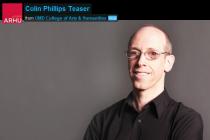Ling Colloq: Marcin Morzycki (Michigan State)
The Landscape of Nonlocal Readings of Adjectives
It is an interesting curiosity that _occasional_ can get an adverb-like reading in which it seems to scope outside its DP (Bolinger 1967, Stump 1981, Larson 1999, Zimmermann 2003, Schäfer 2007, DeVries 2010, Gehrke & McNally 2010):
(1) The occasional sailor strolled by.
'Occasionally, a sailor strolled by.'
This is the paradigm case of 'adverbial' or nonlocal readings of adjectives. What seems not to have attracted sufficient attention is that such nonlocal readings of adjectives have been observed in quite a number of other constructions. Among them:
(2) a. The average American has 2.3 children. (Kennedy & Stanley 2009)
'On average, an American has 2.3 children.'
b. The whole ferret is submerged. (Morzycki 2002, Moltmann 2005)
'The ferret is wholly submerged.'
c. You opened the wrong bottle. (Larson 2000, Schwarz 2006)
'There is a bottle that it would be wrong for you to open, and you
opened it.'
d. Solange is staying at an undisclosed hotel. (Abusch & Rooth 1997)
'Solange is staying at a hotel, and it has not been disclosed which
hotel it is.'
_Same_ may also belong in this class, and perhaps even expressives like _damn_. All of these adjectives have several similarities, most notably their undue influence on the determiner.
My aim in this talk is to take a wider view of these facts than is customary. An important first step, I believe, is to recognize that across the class, such readings are never available with strong inherently quantificational determiners, and that the class divides in two with respect to the behavior of weak ones. I will explore some analytical alternatives that capture parts of the bigger picture. The hope for a integrated theory of these readings must remain unrequited, but it is from such partial generalizations that one might emerge.
References
Abusch, Dorit & Mats Rooth. 1997. ‘Epistemic NP modifiers’. In A. Lawson (ed.), Proceedings of Semantics and Linguistic Theory (SALT) 7. CLC Publications, Ithaca, NY.
Bolinger, Dwight L. 1967. ‘Adjectives in English: Attribution and predication’. Lingua 18, 1–34.
DeVries, Karl. 2010. ‘Frequency adjectives’. BA thesis, Michigan State University.
Gehrke, Berit & Louise McNally. 2010. ‘Frequency adjectives and assertions about event types’. In Ed Cormany, Satoshi Ito, & David Lutz (eds.), Proceedings of Semantics and Linguistic Theory (SALT) 19, pp. 180–197. eLanguage, Ithaca, NY.
Kennedy, Christopher & Jason Stanley. 2009. ‘On ‘average”. Mind 118(471), 583–646.
Larson, Richard. 1999. ‘Semantics of adjectival modification’. Lecture notes, LOT Winter School, Amsterdam.
Larson, Richard K. 2000. ‘ACD in AP?’ In Roger Billerey & Brook Danielle Lillehaugen (eds.), Proceedings of the West Coast Conference on Formal Linguistics (WCCFL) 19. Cascadilla Press, Somerville, MA.
Moltmann, Friederike. 2005. ‘Part structures in situations: The semantics of Individual and Whole’. Linguistics and Philosophy 28(5), 599–641.
Morzycki, Marcin. 2002. ‘Wholes and their covers’. In Brendan Jackson (ed.), Proceedings of Semantics and Linguistic Theory (SALT) 12. CLC Publications, Ithaca, NY.
Schäfer, Roland. 2007. ‘On frequency adjectives’. In E. Puig-Waldmüller (ed.), Proceedings of Sinn und Bedeutung 11. Universitat Pompeu Fabra, Barcelona.
Schwarz, Bernhard. 2006. ‘Attributive wrong’. In David Montero Donald Baumer & Michael Scanlon (eds.), Proceedings of the West Coast Conference on Formal Linguistics (WCCFL) 25, pp. 362–370. Cascadilla Press, Somerville, MA.
Stump, Gregory T. 1981. ‘The interpretation of frequency adjectives’. Linguistics and Philosophy 4(2), 221–257.
Zimmermann, Malte. 2003. ‘Pluractionality and complex quantifier formation’. Natural Language Semantics 11(3), 249–287.The linguistics graduate students organize a colloquium series every fall and spring semester. They bring linguists in from all over the world to present their most current work. Often, the Maryland Linguistics Colloquium Series is the first public presentation of ground-breaking research. To receive announcements of the colloquium talks, please subscribe to the Linguistics Colloquium Series listserv. You can also subscribe to an RSS feed that lists all of our colloquium talks.










